TOP STORY - Partnership Across the Pond
Two Advocacy Organizations Sign MOU
by Joy Willard-Williford
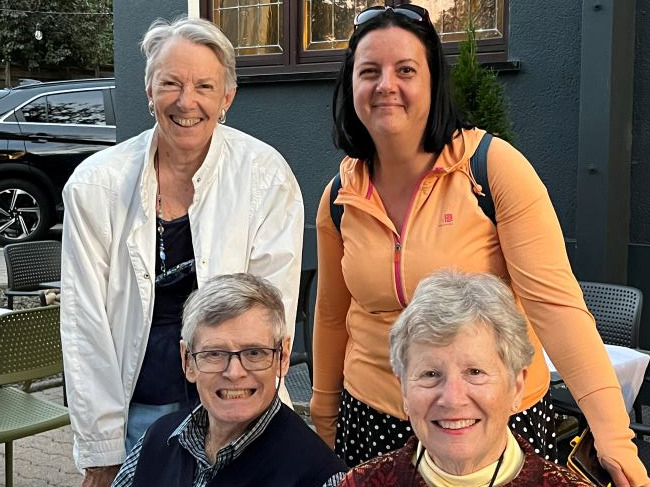
Ginger Irvine, Despina Dina, Mark Williford, and Joy Willard-Williford, Homburg, Germany, September 2023
Thank you for reading this 46th edition of NA News. Inside this issue, we feature ways in which the two advocacy organizations are partnering in common cause, we learn about speed dating between advocacy organizations and scientists, we read about Ruth Walker's visit to Oregon, the experiences of several patients, including the importance of cardiac management for XK patients, and there is a report on the two most recent VPS13 Forums. Read on, learn and enjoy...
The two advocacy organizations, The Advocacy for Neuroacanthocytosis Patients (NA Advocacy), a UK registered charity, and Neuroacanthocytosis Advocacy USA (NA-USA), a US 501(c)(3) non-profit organization, work closely together towards their common purposes to provide support to patients with VPS13A or XK disease and their families and caregivers, to foster and fund research, and to promote awareness of the two diseases. In fact, they refer to one another as “sister organizations.”
Recently, the two organizations signed a formal Memorandum of Understanding (MOU) to seal their commitment to the relationship. The MOU provides a mechanism for both advocacies, in furtherance of their own charitable mission and in compliance with the rules and regulations of both countries, to periodically transfer funds from one organization to the other. This is helpful when both organizations contribute to funding the same research project, but only one organization is the lead entering into a legal agreement to grant funds to another entity for research purposes.
NA-USA was founded in 2019 with the encouragement of NA Advocacy, founded in 2002. From the initial founding of NA-USA, the two organizations have worked closely together. Ways in which this plays out include, but are not limited to:
- Ginger Irvine, president of NA Advocacy, is a dual citizen of the UK and the US. She serves on the board of NA-USA and has done so since its founding.
- Joy Willard-Williford, president of NA-USA, attends NA Advocacy board meetings as an observer.
- Both organizations make possible the NA News, with the NA Advocacy being the owner/publisher, its charity manager, Despina Dinca, serving as key writer, and Joy putting it all together while Ginger and Despina give final editorial approval.
- Both organizations participate in planning the bi-annual neuroacanthocytosis symposium, with focus on the patient and caregiver track.
- Both organizations work to promote the VPS13 forums.
- In December 2024, the two boards plan to meet virtually for a “meet and greet.” It is anticipated that, going forward, the two organizations will be looking to do strategic planning around their common purpose and mutual futures.
Individually, each organization manages its own social media and web page, raises its own funds, and exists as its own separate legal entity, among other things.
Both boards are always looking for new members committed to furthering their purpose. Contact Ginger at ginger@naadvocacy.org or joy@naadvocacyusa.org if you are interested.
 |
|
 |  |
Speed Dating for Scientists
Ginger, Despina, & Adrian Attend Aspire Biosciences Event in London
by Despina Dinca
No, seriously, it is just like speed dating! And it’s meant to be benefits patients, their families and cares on one side, and the scientist on the other side. Read on...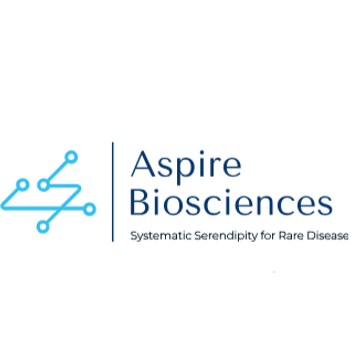
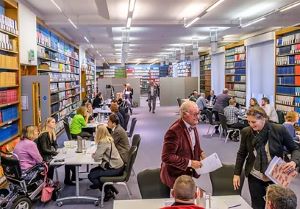 The Advocacy for Neuroacanthocytosis Patients had the privilege to be selected to be part of a partnering event specifically organised for rare neurology/central nervous system (CNS) diseases organised by Aspire Biosciences in London, at the Royal Society of Medicine on 15 October 2024. The Advocacy for Neuroacanthocytosis Patients had the privilege to be selected to be part of a partnering event specifically organised for rare neurology/central nervous system (CNS) diseases organised by Aspire Biosciences in London, at the Royal Society of Medicine on 15 October 2024.
In this all-day event, the organisers are looking to enable partnerships between rare disease patient organisations and life sciences companies.
There were eight charities and nine life sciences companies this year. Each patient organisation presented their ‘elevator pitch’ about who they are, what’s their mission and most importantly, what are the unmet needs of those they represent (general; family and patient related; clinical research, and basic science related). Our presentation was prepared by Ginger Irvine, Chair and Co-founder, Professor Dr Adrian Danek, Trustee, and Despina Dinca, Charity manager. Then the life sciences organisation followed with their elevator pitch where they explain what their research focus and interests are.
Once all the introductions were made, each charity had a 12-minute session with each life science organisation to explore the areas of interest which could be matched. Although attendees are carefully selected, not every organisation is expected to be within the matching range. The offers are very diverse and cover various stages of science and research and a charity organisation may or may not be at that stage in their own existence.
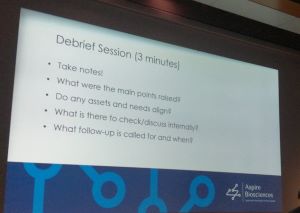 It was a fruitful day for us! We were matched with three organisations with potential for immediate collaboration and we’re already following up with other three organisations to explore further adjacent/future opportunities. It was a fruitful day for us! We were matched with three organisations with potential for immediate collaboration and we’re already following up with other three organisations to explore further adjacent/future opportunities.
While we’re bound to some confidentiality about our conversations for now, we’ll be sure to share and keep you posted about how these potential collaborations will be evolving in our next NA News as well as on our social media channels. Stay tuned and keep the conversations going with us!
 |  |
Reporting on 18th and 19th VPS13 Forums, 29 July and 28 October 2024
Read about the interesting presentations given at the most recent two Forums
by Despina Dinca
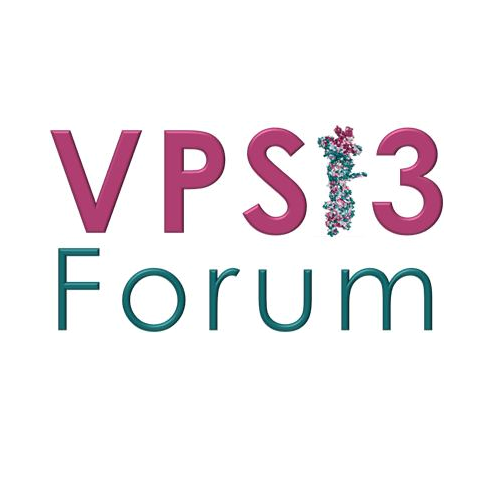 The topics of the two forums were nutritional challenges among people with feeding dystonia and the latest developments in the research of VPS13C in July and October, respectively. The topics of the two forums were nutritional challenges among people with feeding dystonia and the latest developments in the research of VPS13C in July and October, respectively.
The VPS13 Forum is the result of a continuous collaboration between amazing scientists, clinicians and researchers, who are keeping the conversations going about the research developments related to the neuroacanthocytosis (NA) syndromes while also looping in us, the advocacies, so we can keep passing on the latest updates to our communities of patients, their families as well as the wider public all over the world.
Each Forum has a current topic of interest. On 29 July 2024 we heard about the nutritional challenges among people with feeding dystonia. The scientific presentations were followed by a Q&A session, where expert clinicians answered questions from patients and carers. We published a Report of the 18th VPS13 Forum (pdf).
On 28 October, at the 19th VPS13 Forum, we had the opportunity to hear about the latest developments in the research of VPS13C, a protein-coding gene from the same group as VPS13A. Be sure to follow our page where we’ll publish the lay-language summary report in the coming weeks.
Collaboration in medical research is vital especially in the rare diseases field. The small cohorts are one of the major challenges of getting to the point of being able to conduct relevant clinical research. Therefore, exploring ‘neighbouring’ research areas could lead to uncover new ways to approach the challenges and to encourage the progress towards viable therapies in the research for NA syndromes.
The 20th VPS13 Forum is scheduled for Monday, 10 February 2025, from 14:00 CET (Central European Time), so please SAVE THE DATE. Details about the topic, agenda and how to join us will be published nearer the time on our social media. We look forward to seeing you there in 2025!
 |  |
Regular Cardiac Evaluations Critical to XK Patients
Heart Abnormalities Lead to XK diagnosis in Young Man
by Nathan Adkerhielm and Joy Willard-Williford
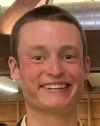 Nathan Akerhielm shares how heart issues led to his diagnosis of XK disease at age 25. Nathan Akerhielm shares how heart issues led to his diagnosis of XK disease at age 25.
My story is pretty wild, as my symptoms presented first as cardiac ones.
I ran cross country and track in college from 2017-21 and then moved to Charlotte, North Carolina for work. I was on a normal run in August 2022 when I suddenly felt weak and out of breath. I laid myself on the sidewalk, and after 5-10 minutes, two other runners saw me and called 911. I never lost consciousness but when the Emergency Medical Team arrived my heart rate was 250 bpm. They shocked me in the back of an ambulance to get out of the arrhythmia and at the hospital I was diagnosed with Arrhythmogenic Right Ventricular Cardiomyopathy (ARVC).
Genetic testing revealed I had deletion in the XK gene, but my doctors in Charlotte still assumed I had Arrhythmogenic Right Ventricular Cardiomyopathy (ARVC). I attended the ARVC seminar at Johns Hopkins Medicine the last two years, but they had not seen this genetic variant with ARVC patients before. I recently met with cardiologist Dr. Hugh Calkins and geneticist, Brittney Murray, in Baltimore, and based on my genetic test, history of high CK levels in my bloodwork, and otherwise normal heart function, they diagnosed me with McLeod Syndrome (XK). I haven't had any neurological symptoms.
I am very interested in connecting with other young people with XK disease.
 |  |
Ruth Walker Visits Portland, Oregon, USA
Ruth is Visiting Scientist and Meets with XK Family
by Ruth Walker
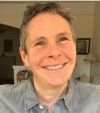 Ruth Walker shares of her experience as a visiting scientist to the Portland Veterans Affairs Medical Center and her corresponding visit with an extended Oregon family with XK disease. Ruth Walker shares of her experience as a visiting scientist to the Portland Veterans Affairs Medical Center and her corresponding visit with an extended Oregon family with XK disease.
This October I was honored to be invited for the second time to be a Visiting Scientist to the Portland Veterans Affairs Medical Center and Oregon Health Sciences University (OHSU). This typically involves giving a couple of talks to the group at the Parkinson’s Disease and Movement Disorders Center and interested researchers, and I decided to take the opportunity to extend my stay by a couple of days so that I could meet with some other friends and colleagues.
At the Homburg neuroacanthocytosis symposium last year, the Pero-Edwards family, who have been deeply affected by XK disease (McLeod syndrome) had invited me to visit them in Portland, OR, so this was the perfect occasion for us to get together. Karen (wife of the late Jerry Pero), Linda (mother of Geno and Tony, who very sadly died 5 years ago), Geno and his wife Joni, Richard (Linda's husband), and I had a really beautiful lunch at Q restaurant in downtown Portland (rated #1 on Tripadvisor!). We had a very productive discussion about many aspects of XK disease including a number of clinical issues and what is needed to move the research forward.
Linda had called ahead of time to request a table where we would have some privacy and time to talk for a few hours; when she went to pay the bill she spoke to the manager, Mazen Hariri, and explained to him about the family members affected by this ultra-rare disorder, including the sudden death of her son Tony from XK disease. He was very moved by this then told her that he had lost his daughter, also to a very rare disease, and they shared a hug. And then, most generously he picked up the tab for our meal! (group photo)
The next day I met Dr. Miranda Lim (photo at bottom right), indefatigable sleep neurologist who took the lead on our recent paper on sleep disorders in XK disease. She performed sleep studies on the local family members affected by XK disease, and continues to be Geno's sleep specialist. We talked about many aspects of our work in XK disease, and came up with some interesting questions to be answered. 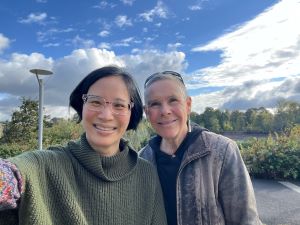
On Thursday October 17th I gave 2 talks at the Portland VA/OHSU - the first on "The approach to the patient with chorea" (which of course mentioned VPS13A and XK disease) and the second on "Recent advances in neuroacanthocytosis syndromes". The audience included a number of university neurologists, researchers, and fellows, including some (such as Dr. Amie Hiller) who have already been involved in our work in this area. The talks seemed to be well-received, and there were some excellent questions.
My visit was capped the next day by lunch at a local winery - certainly a wonderful way to mix business and pleasure!
 |  |
Voice Workouts - New Session
Maintaining and improving oral communication is an important therapy for patients diagnosed with VPS13A or XK disease.
by Alex Irvine and Elina Tripoliti
 We’re back with a new session! Maintaining and improving oral communication is an important therapy for patients diagnosed with VPS13A (chorea-acanthocytosis) or XK (McLeod) disease. We’re back with a new session! Maintaining and improving oral communication is an important therapy for patients diagnosed with VPS13A (chorea-acanthocytosis) or XK (McLeod) disease.
 Dr Elina Tripoliti, speech therapist from University College London, and Alex Irvine, VPS13A patient, share the daily voice workout they’ve been using. It doesn’t need to be something complicated, but it’s important to do it every day. And you can be as creative as you want, Alex certainly enjoyed creating some cat limericks recently! Dr Elina Tripoliti, speech therapist from University College London, and Alex Irvine, VPS13A patient, share the daily voice workout they’ve been using. It doesn’t need to be something complicated, but it’s important to do it every day. And you can be as creative as you want, Alex certainly enjoyed creating some cat limericks recently!
Check out their new 5-minute video on our YouTube channel!
For the warm-up, these are the easy-to-follow steps for any daily voice workout:
- Clear your throat. Have a glass of water handy, maybe with a straw.
- Take a deep breath and say /AAAAAAAA/ for as long and as LOUD as you can.
- Take a deep breath, start from your comfortable pitch, and go as high as you can for just 5 seconds. Don't forget to be LOUD!
- Take another deep breath, start from your comfortable pitch and go as low as you can for just 5 seconds. Be even LOUDER!
- Repeat the above 5 times.
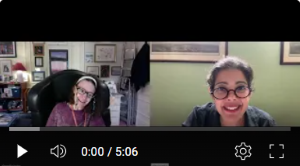 You may find that reading is your thing. Poetry reading could be enjoyable. Alex certainly enjoys it. But she also enjoys creating her own poetry! You may find that reading is your thing. Poetry reading could be enjoyable. Alex certainly enjoys it. But she also enjoys creating her own poetry!
We hope you enjoy this session’s limerick (for those unfamiliar with the term, limericks are humorous five-line poems with a rhyme scheme aabba).
Elina and Alex have a great artistic project they’ll be revealing in a little while. And
they’ve already lined up more tips and tricks.
So, stay tuned, keep practising every day, and come back to see what we’re up to next! Don’t forget to like and share the new video with anyone who it may be of interest to.
 |  |
Patient Stories - Gary Gans
A Patient Advocate for Persons with Disabilities
by Gary Gans and Despina Dinca
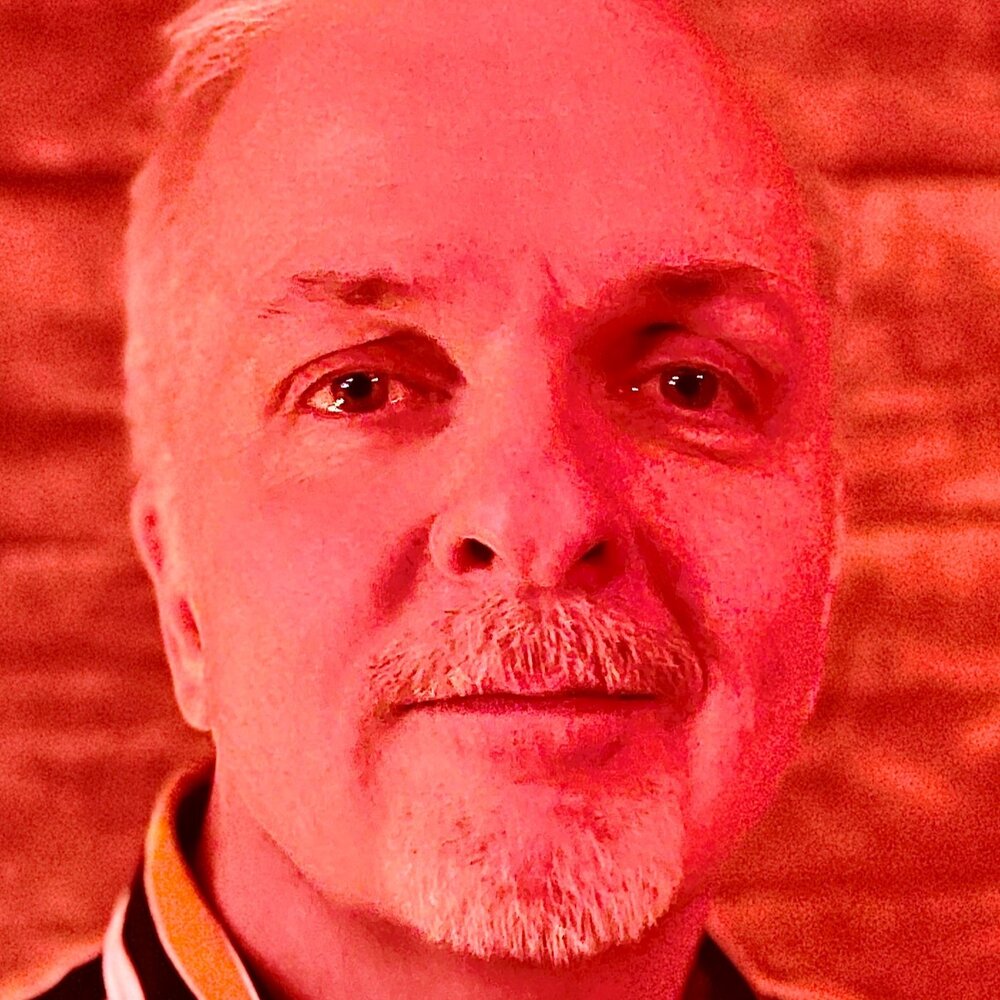 Gary Gans, who has VPS13A disease, shares his advocacy efforts on behalf of all people with disabilities. Gary Gans, who has VPS13A disease, shares his advocacy efforts on behalf of all people with disabilities.
Gary is a patient diagnosed with VPS13A disease (chorea acanthocytosis) who lives in Oxford, UK. Gary volunteers his legal skills together with his real-life experiences of managing in a wheelchair to people who can initiate change to benefit many disabled people. He was involved recently in a consultation with Oxford City, Oxfordshire County Council and Transport for All. He shares his view on his Facebook profile, and he also keeps in touch with Ginger Irvine, our Chair and Co-founder by phone or by email. This is his most recent update where he shares his views on important topics related to disability related policies in the UK and his activity to raise awareness about these issues.
“I apologise for being slow to respond. Typing is increasingly problematic. Due to the progression of VPS13A along with Diplopia and Severe Ischaemic Cardiomyopathy a significant decline in coordination is noticeable. Throw in the stressors caused by the government’s “painful choices” mantra has every person who is disabled or cares about us are all impacted by the expectations of the Chancellor’s impending Budget Speech on 30 October.
I am more than happy to review and share information that I have received regarding the challenges that we face on a repeated basis. The new changes will be implemented without considering that the Equalities Act and the Disability Rights Act makes these changes a flagrant disregard for these laws.
Kerb drops, poor pavements and tarmacs, and the lack of available and affordable transportation options are creating an environment where we are no longer capable of getting out of our homes without risks of injury or harm. The lack of level platforms and the contempt by 97% of train services, our sole option for public transportation use further isolates us and instils a relaxing of our public visibility. Ableism is alive and well in the United Kingdom.
The UN recently reprimanded the Department for Work and Pensions (DWP) and the Government for failing to maintain their role as a nation that fully supports the rights and freedoms that the Disabled deserve. It’s a situation that I am not comfortable with letting our rights and awards by the DWP to be stripped away every time the government needs to find a solution to their fiscal problems.
I am not sure of how long I have left in my life, but I want to make a positive impact for every person whose disabilities limit their ability to live, work or be seen by others, because visibility is critical to our society and the perception of our existence long after my life comes to an end.
I will do everything to make sure that the future continues to remove the stigma and prejudice of who we are as Disabled people with value, dignity and access. This is a very daunting task, but for as long as I am able to do so, however long or short it is, I will continue to push for the de-stigmatisation of being disabled.
Please pass on my warmest regards to Alex. Thank you, Ginger, for all that you do to help us through a cruel disease, that is still pushed to the side due to the limited population that is impacted by neuroacanthocytosis (NA) syndromes, and limited resources because of the lack of financial gains in the treatment of the four types that impact so few globally. Stay strong and well, dear friend.”
Are you doing anything similar in the area where you live? We’d love to hear your stories from the areas where you live and how things are done somewhere else in the world. This is how we can inspire each other and create waves of useful changes.
 |  |
Patient Stories - Peter Clark Update
News from a Patient in Essex, UK
by Peter Clark and Ginger Irvine
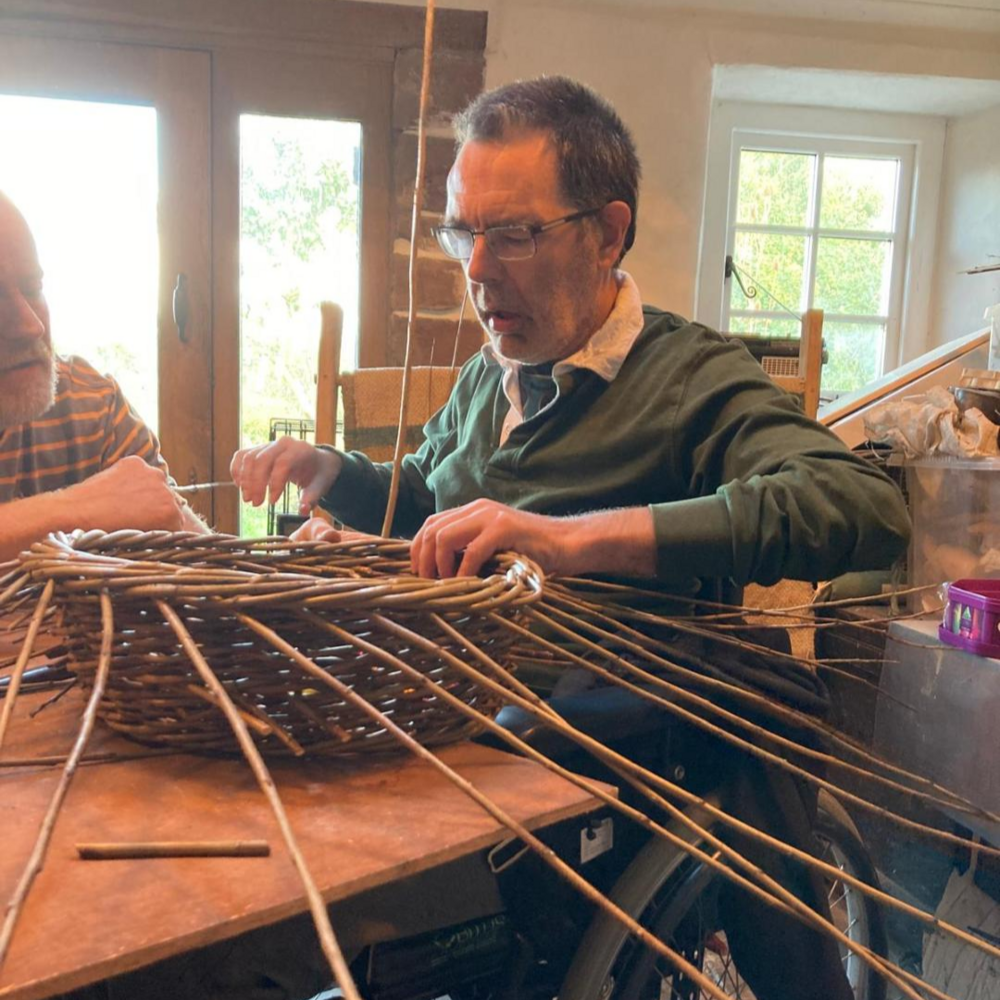 Long term friend and VPS13A patient Pete Clark who lives in Southend, Essex, UK wrote to us about recent activities. Long term friend and VPS13A patient Pete Clark who lives in Southend, Essex, UK wrote to us about recent activities.
Alex and Ginger have met Pete a number of times at the National Hospital in London. Here’s his update:
Hi Ginger and Alex - Two years ago my brother, his partner Pauline and I had a great holiday in the Lake District which was topped off with a visit to an old friend of mine, Phil, a craftsman who makes all sorts of things out of willow. He even got us to have a go at weaving a basket - so now I am the proud owner of a willow basket made by my own fair hand !
In February 2023 Pauline arranged for a fantastic, belated, 60th birthday present for me. We went to a glassblowers workshop where we made glass paperweights, the type with swirls of colour and bubbles inside - that was great fun! Our holiday that year was in Devon where I hired a wheelchair with huge tyres so that I could drive along the beach and down to the waters edge. We also visited two prehistoric stone circles at Stonehenge and Avebury, both of which were very impressive.
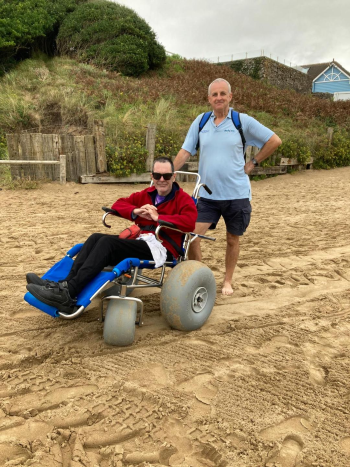 This year we went to Wales and to the top of Mount Snowdon, by train I hasten to add! It was a bright sunny day with clear blue skies and awesome views. Over the past three years we've to the May Day Beltane Festival of Fire at Butser Ancient Farm which culminates in the ceremonial burning of a huge effigy of a wicker man accompanied by a band of about 30 drummers all dressed in Celtic clothes - it's an amazing experience. This year we went to Wales and to the top of Mount Snowdon, by train I hasten to add! It was a bright sunny day with clear blue skies and awesome views. Over the past three years we've to the May Day Beltane Festival of Fire at Butser Ancient Farm which culminates in the ceremonial burning of a huge effigy of a wicker man accompanied by a band of about 30 drummers all dressed in Celtic clothes - it's an amazing experience.
I'm still enjoying going to concerts and have started going to the occasional musical. I continue to love cooking and regularly cook an evening meal for a friend, Alison, and we polish off a bottle of wine between the two of us a really lovely way to spend an evening together.
I still go to local a Huntington's Disease group every Thursday - they are a very friendly bunch and I used to love going to their allotment every week. The sad news is that they have had to give it up - mainly, I think, because of a lack of able bodied volunteers to help out. It's such a shame as that was one of the highlights of my week. ( We had hoped that whoever took over the allotment would let me carry on going to work on it. That was nearly a year ago apparently there are some insurance issues - something to do with health and safety. Still at least there might be some hope of things getting sorted out. )
As far as my condition is concerned the BoTox injections I have in my face continue to work extremely well - I have not bitten my tongue or cheeks for many years now. Eating however can be slow and messy as my tongue tends to push the food out of my mouth. The clarity of my speech can be quite variable and is particularly poor when I'm tired - but I can generally make myself understood. My mobility remains poor and I am always in the wheelchair. I have been having some physiotherapy and I was making good progress - so much so that I was able to walk the length of the corridor with the aid of a walking frame. Unfortunately, for the past six months or so I have been suffering with sciatica in my right leg and this has meant I've not been able to keep up with my exercises.
To end on a more positive note I think I am now more able to manage the pain from the sciatica and so I am hoping to get back to doing regular exercise and we will see where that takes me.
 |
|
|
|